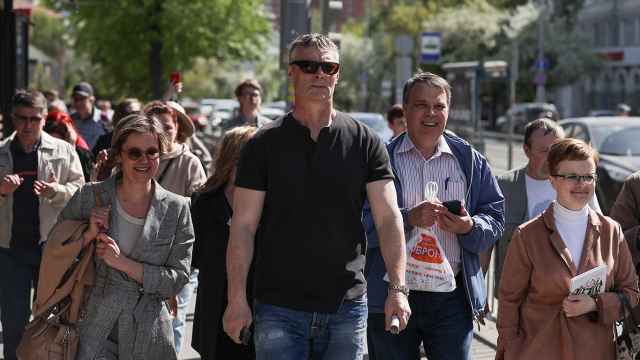Europe's top intergovernmental corruption watchdog has found that Russia has made modest progress in fighting graft between 2010 and 2012.
The country has implemented 15 recommendations out of 26 made by the Group of States Against Corruption, or GRECO, according to a published Friday.
The document, compiled in December, is a follow-up to a compliance report from December 2010 that found that just nine recommendations had been implemented.
GRECO is the anti-corruption body of the Council of Europe, the continent's oldest human rights organization, with currently 47 member countries. Russia joined the council in 1996 and signed up to GRECO in 2007, which functions as a non-binding monitoring group.
Among the 11 recommendations that remain partly implemented are key issues like strengthening judicial independence, reducing the number of officeholders with immunity from prosecution, and prohibiting officials from accepting gifts.
The report notes that no decisive progress has been made to safeguard courts from political interference, and that widespread mistrust vis-a-vis the judiciary persists.
"Bribe-taking in courts represents one of the biggest corruption markets in Russia" and the investigation and punishment of judicial corruption "have not been pursued in a proactive manner," the report says.
The report also criticizes the government for foot-dragging in efforts to reduce the number of officials with immunity.
Currently, immunity from prosecution is enjoyed not only by sitting lawmakers but by registered parliamentary candidates, presidential candidates, former presidents and electoral commission members. It even extends to investigators and lawyers.
GRECO has called for a reduction of those categories "to the minimum required in a democratic society."
The Prosecutor General's Office prepared a draft law for this purpose, and the bill was submitted to the Justice Ministry in September 2011. But the ministry only submitted another draft of its own to the government in April 2012, which has done nothing since, the report says.
The report also says there has been no substantial progress in a reform of the Civil Code, sponsored by then-President Dmitry Medvedev in 2009, that would ban officials from accepting gifts. It criticizes that the bill, which has not yet become law, has been altered to raise the threshold for acceptable gifts from 500 to 3,000 rubles ($100).
However, the report's overall tone is positive, and in their conclusion the authors praise the government's willingness to fulfill a large task in a relatively short time span. "Even though 11 recommendations remain partly implemented, the efforts deployed by the authorities' are commendable," the report says.
Russia was ranked a low 133th out of 176 countries in Transparency International's worldwide corruption index last year.
Contact the author at n.twickel@imedia.ru
A Message from The Moscow Times:
Dear readers,
We are facing unprecedented challenges. Russia's Prosecutor General's Office has designated The Moscow Times as an "undesirable" organization, criminalizing our work and putting our staff at risk of prosecution. This follows our earlier unjust labeling as a "foreign agent."
These actions are direct attempts to silence independent journalism in Russia. The authorities claim our work "discredits the decisions of the Russian leadership." We see things differently: we strive to provide accurate, unbiased reporting on Russia.
We, the journalists of The Moscow Times, refuse to be silenced. But to continue our work, we need your help.
Your support, no matter how small, makes a world of difference. If you can, please support us monthly starting from just $2. It's quick to set up, and every contribution makes a significant impact.
By supporting The Moscow Times, you're defending open, independent journalism in the face of repression. Thank you for standing with us.
Remind me later.






